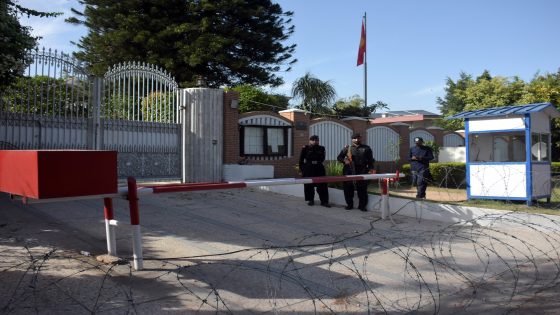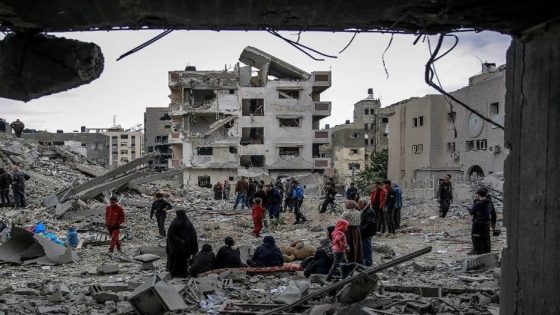Islamabad, Pakistan — More than 300 Pakistani students have rushed home from Kyrgyzstan after a mob attacked hostels occupied by international students, injuring several of them, in the Central Asian nation’s capital Bishkek last week.
The violence broke out in the late hours of May 17, lasting for more than six hours, when hundreds of Kyrgyz people targeted hostels of international students, leaving more than 30 injured.
In a news conference on Sunday, Pakistan’s Foreign Minister Ishaq Dar said Kyrgyz authorities had assured that the situation had been brought under control. He confirmed that “four or five” Pakistani students were injured in the violence but refuted online rumours of any deaths in the clashes.
Yet, Dar appeared to acknowledge the fears of the more than 11,000 Pakistani students in Kyrgyzstan, and their families, announcing that the government was arranging flights to bring back all students who wanted to return. The government, he said, would bear the expenses — though Pakistani students in Bishkek claimed they had to pay out of pocket for tickets back.
So what led to the violence, what happened on May 17, and what is the situation in Bishkek now?
What happened on the night of May 17?
Korish Malik, a 24-year-old Pakistani student pursuing a medical degree in Bishkek, recalled that he was in his hostel when, in the evening, student residents received a message from the hostel administration to stay indoors.
![A large mob targeted hostel in Bishkek where hundreds of international students resided on May 17. [Courtesy of Bilal Ishaq]](https://news.aljadyd.com/wp-content/uploads/2024/05/courtesy-Bilal-Ishaq-1716194777.jpeg)
“The administration said there appears to be a threat to international students and they must refrain from leaving the premises of their hostels. But then we saw on TikTok that a large group of locals was gathering and marching towards our hostel,” he told Al Jazeera from Bishkek.
According to Kyrgyz media reports, a crowd of more than 700 people gathered outside the city’s VIP Hostel, which houses more than 800 international students, including Pakistanis, Indians, Egyptians and Bangladeshis.
Bilal Ishaq, a Pakistani medical student from Faisalabad who lives in a private apartment near the VIP Hostel, said he also received alerts on WhatsApp groups of fellow university students and the Pakistani student community, asking students to stay indoors. He saw a crowd chanting slogans pass his building, moving towards the hostel. The WhatsApp groups, he said, were buzzing with messages from terrified students.
Back at the VIP Hostel, Korish said, soon after students received the warning, police officials arrived and cordoned off the front gate of the building. But the crowd, he said, was large — too large, it turned out.
“While there were a lot of police officials there, they did not have any riot gear with them,” he said. “We were just asked to switch off lights, lock the doors, and put heavy objects in front of the doors of our room.”
Korish said the mob entered the hostel from the emergency exit at the back of the building and went on to indulge in vandalism.
Videos on social media show a huge number of people walking towards the hostel, hurling stones at the windows. Another video shows a door being broken, and glass shattered in the corridor of the hostel.
Korish said he and his three roommates hid in their room on the fourth floor of the five-storey building. They could hear loud noises from other floors, he said.
“The whole thing lasted for almost six to eight hours and when we eventually came out of the room, it was obvious that the mob was there to just cause chaos and spread terror,” Korish said.
What triggered the attack?
The May 17 violence followed a brawl between Kyrgyz locals and a group of international students four days earlier.
Hassan Aryani, a Pakistani student pursuing his degree in medicine, said the videos of the fight went viral among students in the city. Aryani, from Mardan in the province of Khyber Pakhtunkhwa, said an “uneasy calm” hung over the student community in Bishkek after that clash.
On the night of May 17, that tension exploded in mob violence.
What were the international responses?
The embassies of India and Pakistan in Bishkek advised the students to stay indoors.
On the morning of May 18, Pakistan’s Prime Minister Shehbaz Sharif posted on X that he was “deeply concerned over the situation of Pakistani students in Bishkek”.
Deeply concerned over the situation of Pakistani students in Bishkek, Kyrgyzstan. I have directed Pakistan’s Ambassador to provide all necessary help and assistance. My office is also in touch with the Embassy and constantly monitoring the situation.
— Shehbaz Sharif (@CMShehbaz) May 18, 2024
Indian Foreign Minister S Jaishankar also wrote on the social media platform that he was monitoring events in Bishkek, urging Indian students to stay in contact with the country’s embassy.
The Kyrgyz government said on the morning of May 18 that calm had returned to the capital.
![Pakistanis protest against the attacks on international students, including Pakistanis, in Kyrgyz capital of Bishkek last week. [Sohail Shahzad/EPA]](https://news.aljadyd.com/wp-content/uploads/2024/05/sohail-shahzad-1716194557.jpg)
How is the situation in Bishkek now?
Aryani, who is in his final year of college, said while Bishkek appears to be returning to a state of normalcy, he was not willing to stick around in the Kyrgyz capital at the moment.
He said he planned to get a ticket and fly back to Pakistan as soon as he could.
Korish, the third-year student, said he managed to step out of his hostel on Monday morning and could move around the city. But he also said he would travel back to Pakistan to allay his parents’ concerns.
Meanwhile, Kyrgyz authorities also do not want to take chances.
Rasul Abazbek uulu, the country’s deputy minister for education and science, announced in a news conference on Monday that foreign students had been allowed to attend classes online for a week.
The latest announcement helped students like Korish make up their minds about the decision to return home.
“My family is naturally very worried about the situation. But now since our college has said that classes will take place online, and the semester was to end anyway at the end of May, I have bought a ticket to go back tomorrow,” Korish said.
While the Pakistani embassy in Kyrgyzstan says it is in close contact with the local authorities to facilitate the students, several students in Bishkek accused the government of abandoning them. Though Dar, Pakistan’s foreign minister, has said the government would bear the cost of transporting students back, the three students Al Jazeera spoke to all said they had to pay themselves for their tickets. It is unclear if the government plans to subsequently reimburse students.
The Kyrgyz government said those involved in the violence had been arrested and it was in touch with different foreign governments whose nationals were affected by the incident.
“There are no seriously injured people among participants of the incident. The Ministry of Foreign Affairs of the Kyrgyz Republic did not receive any messages regarding injured foreign citizens. At the same time, the ministry urges representatives of the media and foreign diplomatic missions not to disseminate false and unverified information,” the Kyrgyz government said in a statement on May 18.
How many Pakistanis and Indians study in Kyrgyzstan and where?
More than 11,000 Pakistani students and 15,000 Indian students are pursuing degrees in medicine in Kyrgyzstan.
The attraction: a combination of reasonably high standards at Soviet-era medical colleges combined with tuition fees that are lower than most educational destinations in the West and even in their home countries. Kyrgyzstan medical colleges are also popular among students from several Arab and African nations.
![Kyrgyz media reports that more than 700 people were part of the mob that attacked international students in Bishkek. [Courtesy Korish Malik]](https://news.aljadyd.com/wp-content/uploads/2024/05/Courtesy-Korish-Malik-1716194805.jpeg)
Ishaq, the student from Faisalabad, said while his medical degree in Pakistan could cost him nearly eight to nine million rupees ($28,000 to $32,000), the corresponding amount in Kyrgyzstan was closer to four to five million rupees ($14,000 to $18,000).
“It was a lot more feasible to study here money-wise. But now, with the Pakistani currency devaluation, the cost for studies even here is increasing,” he added. The Pakistani rupee, which stood at 160 against the US dollar in December 2020, has since slipped by more than 70 percent to 278 rupees a dollar.



